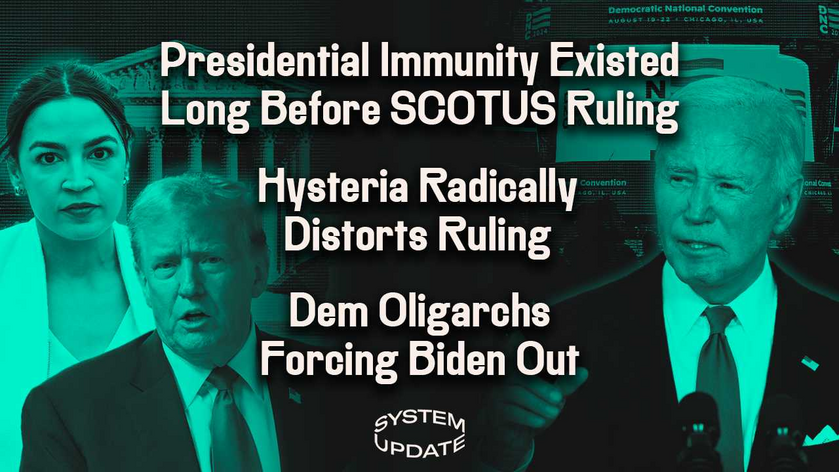Watch the full episode HERE
Good evening. It's Wednesday, July 3.
Tonight: the top story dominating our politics for obviously understandable reasons, is the massive, multi-pronged pressure being applied by multiple power centers to force a sitting President, Joe Biden, out of the election and possibly even out of the White House, despite his obvious and genuine desire to remain. We'll examine the various democratic implications of all of that in a few minutes. But before we get to that, the Supreme Court last week issued a ruling regarding the scope of presidential immunity relating to criminal prosecution in the context of the attempt by Jack Smith and the Justice Department to prosecute Donald Trump for his behavior after the 2020 election.
This is the first time in history that the Supreme Court or any court had to address this specific question and the reason for that is an obvious fact, namely, never before in our nation's history has any president been criminally prosecuted, either during their presidency or after. We'll leave it to you to ask whether that's because no American president before Trump has ever violated the law while in office or if this is yet another instance of longstanding and unquestioning American traditions and norms being disregarded in the singular name of Donald Trump. Whatever is true about that, it is vital to engage in a sober, careful and accurate analysis of what this ruling said, both because it is an important decision in its own right, but also because I have rarely – if ever – seen a Supreme Court decision be so deliberately distorted, misrepresented, exaggerated and hysterically maligned as the one issued by the court last week in Trump v. United States.
I say that not because I am a fan of or supporter of presidential immunity. The exact opposite is true. One could say, without exaggeration, that opposition to presidential immunity under criminal law was one of the two or three issues I focused on most during the first decade of my journalism. It was one of the reasons I started writing about politics in the first place. I wrote two books, my first one in 2006 and especially the one in 2011, which were devoted to denouncing the evils and dangers of immunizing the president and other high officials from the mandates of the law to which all other citizens are subjected. But that's exactly my point. To hear the liberal punditocracy and the corporate media tell it one would believe that presidents before last week were held fully accountable under the law, in the same way that every other citizen is, and that presidents always have been held accountable for their crimes, all this noble fairy tale about the American justice to come to an abrupt and tragic end when a fanatically conservative Supreme Court turned centuries of tradition and precedent, uplifting American tradition on its head solely to protect Donald Trump, both from his past crimes as well as to enable future crimes he wants to commit if he returns to the White House.
That really is the dominant narrative. And to call that narrative grossly misleading and an insult to our intelligence is to understate its transgressions. There has for decades been a virtual unit of virtually universal consensus among Washington elites, in both parties and the media that a president should never – must never – be prosecuted for any crimes they commit while in office. Any time anyone proposed over the last several decades that presidents be prosecuted for the crimes they have committed, both media and political leaders have acted with horror, insisting that only in Third World “banana republics,” as they call them, presidents are prosecuted by successor governments.
Indeed, what the Supreme Court ruled last week bears almost no resemblance to what has become accepted dogma about what the court did. At worst, one can say that the Supreme Court last week merely formalized a form of presidential immunity that in practice has, for better or worse – and I think it's for the worse – dominated and governed Washington for decades, if not longer. But the reality is that the court's ruling was actually far more partial, nuanced and ambiguous than almost all media counts and hysterical denouncement have suggested. It's more nuanced than the way Washington has treated presidential immunity for the last several decades. And we'll demonstrate why that is the case with a careful analysis of what the court did and did not say.
For now, welcome to a new episode of System Update, starting right now.






















